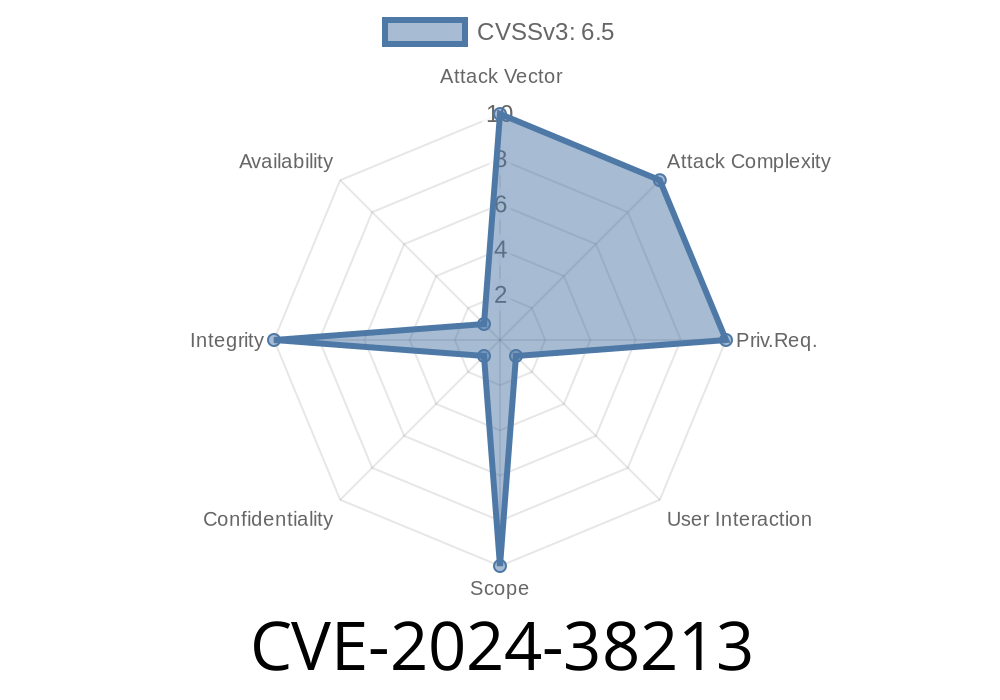Explore how CVE-2024-38213 allows attackers to bypass key Windows security, with code, references, and real-world exploitation details.
What is CVE-2024-38213?
CVE-2024-38213 is a security issue found in Microsoft Windows. It affects something called "Mark of the Web" (MotW), a feature Windows uses to flag files downloaded from the internet by adding metadata. Because of this mark, Windows and apps like Microsoft Office activate extra safety checks to help protect users from malware and phishing attacks.
With this vulnerability, hackers can trick Windows into not applying those extra protections—even though a file comes from the web. This opens the door to malware running without a warning prompt.
Microsoft published the official advisory here:
🔗 CVE-2024-38213 | Windows Mark of the Web Security Feature Bypass Vulnerability
Why Does "Mark of the Web" Matter?
Whenever you download a file using a browser or get an email attachment, Windows tags the file with extra info ("alternate data streams") like so:
Zone.Identifier:ZoneId=3
When you open such a file, Windows shows warnings or even blocks macros.
Attackers love to get around this. If files DON'T have the Mark of the Web, they're treated as safe, and malware can run more easily.
How Does CVE-2024-38213 Work?
This vulnerability allows crafted ZIP (and sometimes other container) files to bypass Mark of the Web tagging on their contents, even if the archive is downloaded from the internet. This has happened with past vulnerabilities (like CVE-2022-41049), but CVE-2024-38213 is a new variant.
Because of how the ZIP is built, Windows fails to forward the MotW to extracted contents.
- When you double-click those files, no warnings—macros or scripts can run as if local/safe!
Real Exploit Example
Below is a Python code snippet to create a ZIP file that can bypass MotW under vulnerable conditions. (This is for educational use only—do not attack systems you do not own!)
import zipfile
filename = "malicious.zip"
# This is the file we want to sneak past MotW
malware_code = b'@echo off\necho You have been pwned! > pwned.txt\n'
with zipfile.ZipFile(filename, 'w') as z:
# Craft archive with deep folder
nested_name = 'A' * 250 + '/evil.bat'
z.writestr(nested_name, malware_code)
print(f"[+] Created {filename}. Try downloading and extracting on unpatched Windows.")
Creates a .zip with a file nested in a deep folder path.
- Some vulnerable Windows systems fail to tag the extracted file with MotW if the path or metadata is crafted in certain ways.
When the victim extracts the ZIP and launches evil.bat, it will run *without* the MotW warning.
Additional Resources & References
- Microsoft Advisory – CVE-2024-38213
- Windows Mark of the Web - What is it?
- Leprechaun: New Ways to Bypass MoTW (blog)
- Twitter/search for CVE-2024-38213
User Awareness: Even with MotW fixes, always be caution with internet downloads.
- Use Advanced Security Tools: Consider EDR or endpoint security software that doesn't just rely on MotW.
Conclusion
CVE-2024-38213 shows that attackers and defenders are in a constant game of cat and mouse. Mark of the Web remains a crucial line of defense on Windows—but this flaw shows it's not foolproof.
Have your IT team check for patches now, and always be careful with files from the Web!
*If you found this exclusive deep-dive useful, share it with your IT friends and help make everyone a bit safer online.*
Timeline
Published on: 08/13/2024 18:15:30 UTC
Last modified on: 08/24/2024 00:06:13 UTC
